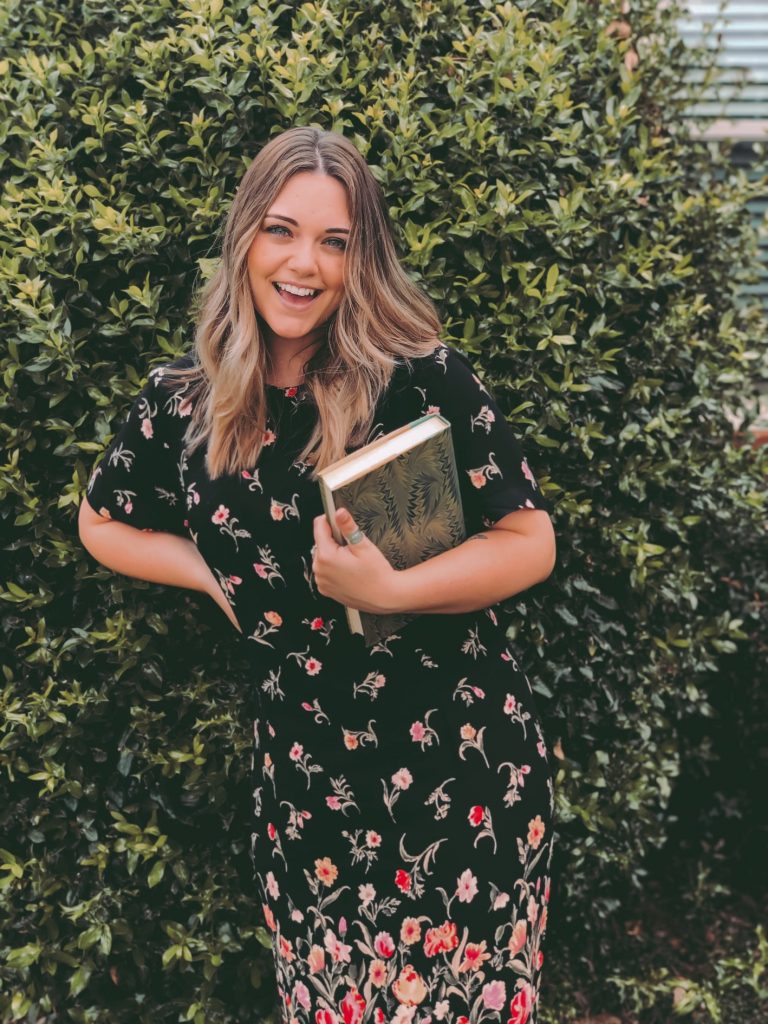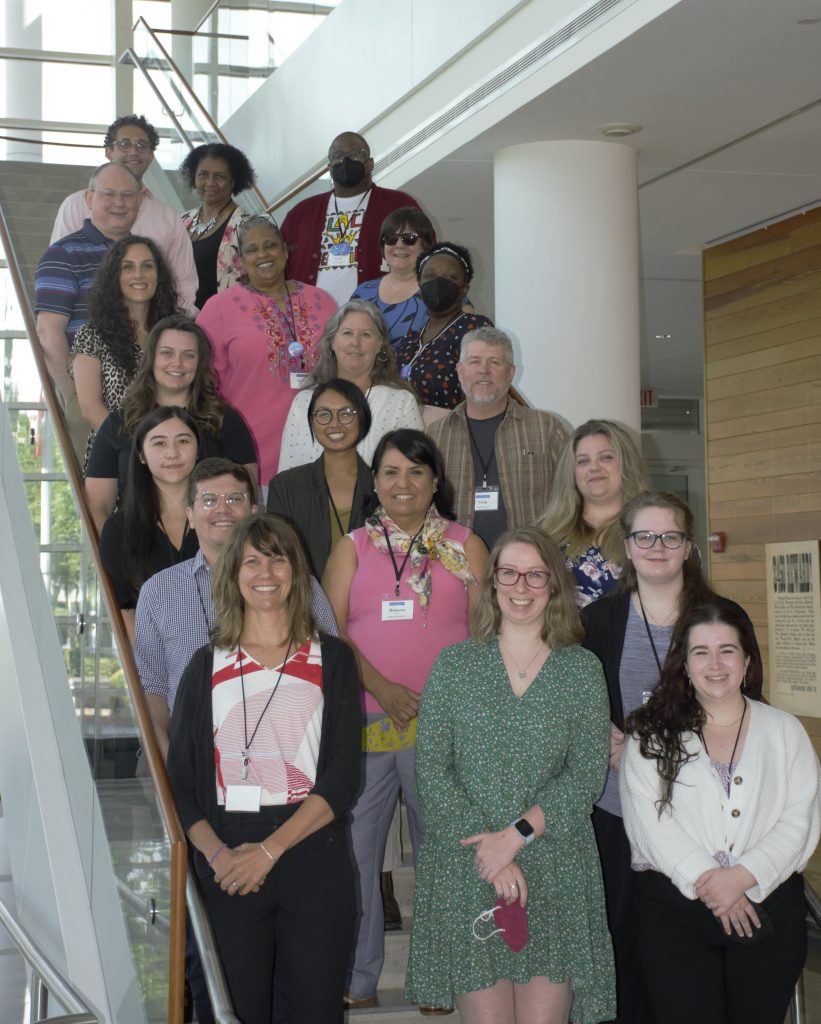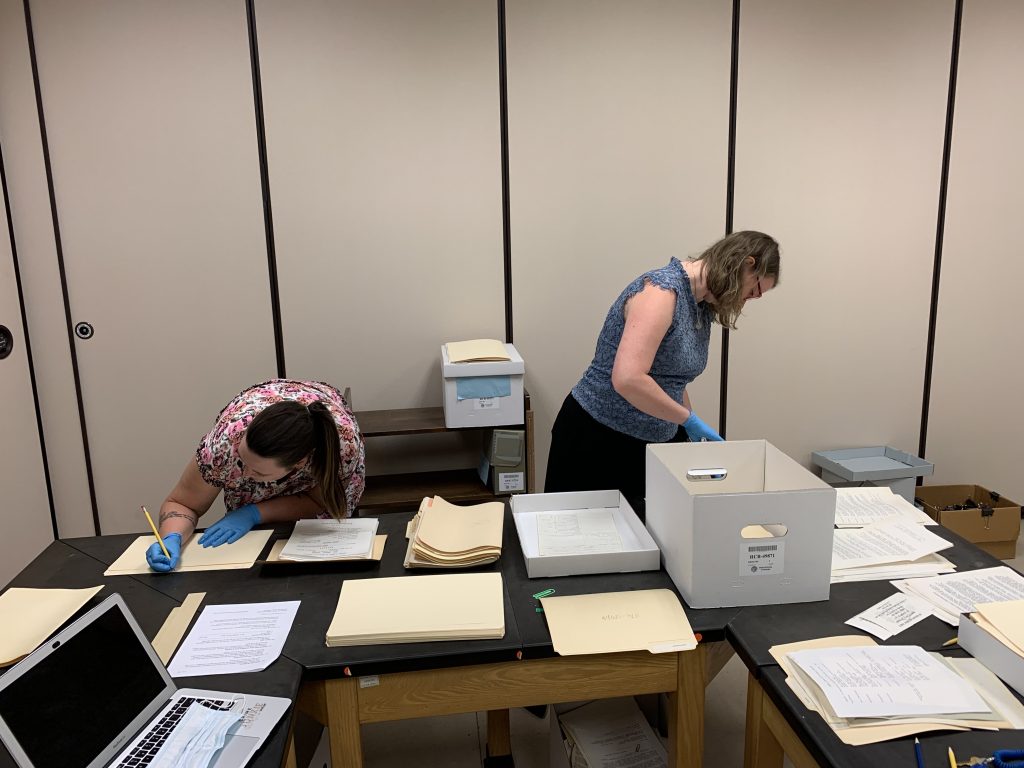By Alyssa Windsor

Hi Archives blog! My name is Alyssa and I’m about to celebrate my one-year anniversary of working in the Archives here at Rollins! I got my Bachelor’s degree in History and my Master’s in Public History, with hopes of a career in libraries and archives (and here I am!) I am from Georgia, the Milledgeville area originally but I spent many years of my life near Savannah, a place that I affectionately refer to as the history capitol of the state. My official title here at Rollins is Archival and Digital Services Coordinator. That means I’m here to fulfill your research needs and help make materials accessible to you digitally! This is my first blog entry and I’m here to share with you a piece of my professional development journey.
The Georgia State Archives in Morrow, Georgia sits adjacent to the National Archives at Atlanta. These facilities are state of the art and more than adequate for training archivists and librarians. The State Archives houses Georgia’s historical documents, while the National Archives holds government documents created by Georgia, Alabama, Florida, Mississippi, Kentucky, North Carolina, South Carolina, and Tennessee. The Georgia Archives Institute (GAI) has been teaching archival theories and carrying out basic archival instruction since its founding in 1967 by former Georgia Department of Archives Director, Carroll Hart. The program has changed a great deal over the years, but today it is a two-week instructional workshop that consists of a three-day on-site internship in the greater Atlanta region. That means there is a great deal of information to digest and comprehend in a short period of time. For those of you that have a Masters in Library Science, or are thinking about getting one, do you think you could do it in two weeks? The Institute prides itself in being able to provide guidance on the basics, while giving students an opportunity to utilize what they have learned on real collections. They do not promise a full degree by any means, but the Institute can impart a strong foundation for those seeking further education in the field and a knowledge boost for those who are already in the profession.
The first week of the Institute provided an opportunity to meet archivists, librarians, and those aspiring to be records or informational professionals from all over the country. This class’s composition consisted of community, academic, medical, government, and science archivists and librarians from as far as California. Perhaps the most rewarding aspect of the first week of class was having the opportunity to discuss how other institutions do their best work for the benefit of their students and patrons, as there is always more to learn about how we can better serve the public. We discussed topics such as arrangement and description of archival collections, preservation, copyright, access, how to provide the best reference and research services to researchers, as well as digital scholarship, and diversity, equity, and inclusion initiatives within libraries and archives. Throughout the week, we worked in small groups on case studies. This component of the curriculum helped us to consider different ways to handle various situations, materials, and questions that we are likely to handle in a real-world scenario.

On the second week, the class went their separate ways to their respective internship locales. Each institution that hosted interns had a very different scope and collection focus, therein providing us students with a wide variety of collections with vastly different needs. The Institute works closely with institutions like Georgia State University, Clayton State University, the Center for Disease Control, Emory University Libraries, the Auburn Avenue Research Library, and others. My internship took place at our host institution, the Georgia Archives. Here, a fellow GAI classmate and I worked with the state of Georgia’s team on processing two separate collections. Each collection had very different needs, one being mostly processed and well-organized but needing a finding aid to ensure researcher access. The second collection had been donated to the Archives in the late 1970s and remained unprocessed and in disarray until now, thus needing a full and proper examination as well as processing. This consisted of getting rid of duplicates, removing rusted metal paper clips, and keeping similar documents together to create a logical order. Should you ever need to access the finding aids of two organizations formerly known as the Georgia League of Historical Societies and the Georgia Coalition of Consultation, Education, and Prevention, you can view them in the Georgia Archive’s finding aid database! These two collections, however, do not even begin to scratch the surface of what you can learn about the history of Georgia and the Colonial South from the exhaustive and extensive collection of materials housed at the Georgia Archives.

The Georgia Archives Institute has a long history of attracting not just U.S. participants, but international attendees as well, with past students being from Canada, the Virgin Islands, Italy, Indonesia, Thailand, Africa, New Guinea, and New Zealand. The institute goes beyond professional development by also encouraging higher education and lifelong careers in the archival field and giving students information on how to pursue those paths that interest them. It is an extremely useful opportunity for any Rollins students who can picture themselves in a library or an archive, as there are no age limits for attendees! The Institute also offers a few scholarships to fund travel and lodging for students, or anyone, who desires to participate. Though the state of Florida does not have an equivalent to the Institute, know that Rollins prioritizes its students and community members by seeking out opportunities like this one for their employees. Your team of librarians and archivists at Olin Library never stop learning.
GAI provided me with a great deal of archival knowledge that my previous degree programs did not delve into. I attended a public history program and though I completed a year-long internship in an archive, my training focused on theory and the purpose of the field rather than hands on experience for specific career paths. The Institute refined my archival vocabulary and provided me with new tools and resources to problem solve at my job. It was particularly enlightening to meet with the Georgia Archives’ conservation team. They are fortunate enough to have a conservation lab in their building that allows them to repair books, tears in paper, and remove mold and insects from books and documents. This is a practice that I knew to be necessary but was unaware that this specific role existed. I learned a great deal about archival conservationists and what kind of training they go through. For example, my internship at the Georgia Archives allowed me to work with the conservation team to separate two documents that had been fused together by a chemical reaction from 60-year-old carbon paper, providing me with the confidence to make conservation and preservation decisions on my own in the future. The conservation lab also hosts one intern per year; a wonderful opportunity for students.
Collaboration is a theme that shined through over the course of the two-week program as I watched professionals with varying roles come together to display the importance of each position within the context of a larger library or an archive. Collaboration is an aspect of my job that I take great pride in at Rollins. It is also a key value prioritized by the field and the Georgia Archives Institute. As someone who thrives on communication and cooperation, I’d like to express to any student or professional that this two-week undertaking is worth it! I’m also a Georgia native, and can provide advice on navigating the archival/library community in Atlanta. If anyone has any questions or wants to learn more, you can visit me in the Rollins Archives on the first floor of Olin Library or check out GAI’s website for more information!
